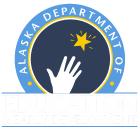- Cama-i, quyana tailuci!
- (Central Yup’ik)
- "Greetings, thank you for coming!"
REL Report: State-Funded Preschool in Alaska
A new REL Northwest report on Alaska’s Pre-Elementary Grants (PEGs) found participation in this state-funded preschool program was positively related to kindergarten readiness, English language proficiency, attendance, and math assessment scores.
Created in 2016, PEGs allow school districts across Alaska to design, develop, and expand preschool programs in their communities. PEGs specifically aim to serve historically disadvantaged students. The study examined how districts implemented the grants and the characteristics and outcomes of children who participated in PEG programs. Findings include:
- PEG districts served a higher proportion of Alaska Native students, English learner students, and students in rural remote schools than did non-PEG districts.
- PEG districts used the program’s flexibility primarily to provide or support part-day preschool.
- Participation in state-funded preschool (including PEG) between 2013/14 and 2017/18 was positively related to kindergarten readiness, kindergarten and grade 2 English language proficiency, kindergarten and grade 1 attendance, and grade 3 math assessment scores.
“The study findings on student outcomes are promising,” says study author Ashley Pierson of Education Northwest. “We hope that Alaska can use this research to inform efforts to expand preschool, particularly in rural areas of the state.”
View the report and an infographic of the study’s key findings on the REL Northwest website.
For more information about the study, contact Ashley Pierson at ashley.pierson@ednw.org.
REL Northwest is one of 10 Regional Educational Laboratories funded by the U.S. Department of Education’s Institute of Education Sciences to help educators use data and research to improve student outcomes. Operated by Education Northwest, REL Northwest serves Alaska, Idaho, Montana, Oregon, and Washington.

